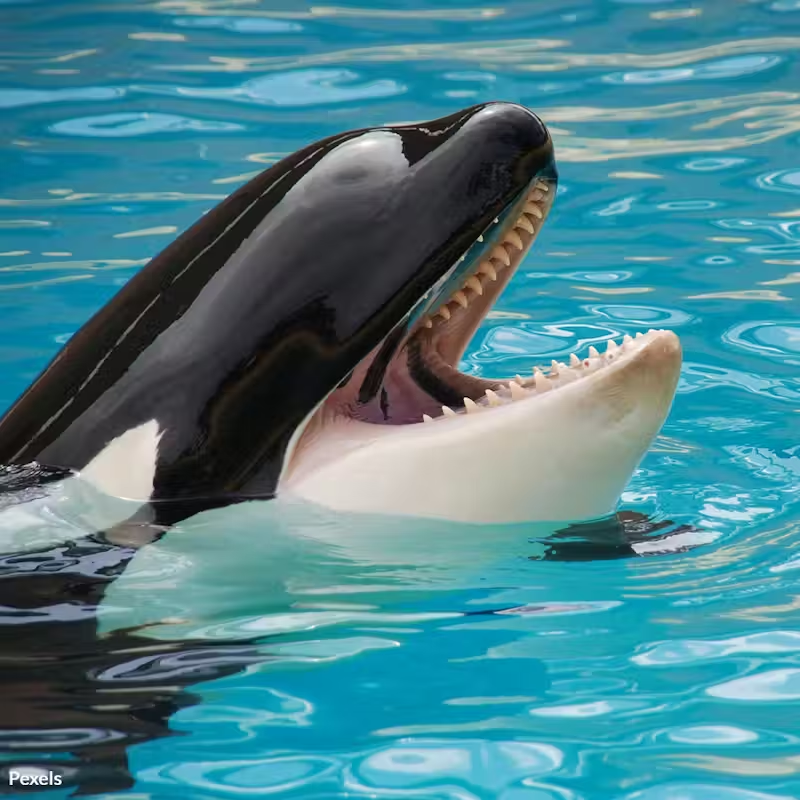End Thirty Years Of Cruel Captivity For Latin America’s Last Orca
1,877 signatures toward our 30,000 Goal
Sponsor: The Animal Rescue Site
Kshamenk has suffered over three decades of isolation in a concrete tank—it's time to end his captivity and restore his dignity. Take action now to free the last captive orca in Latin America.

For more than 30 years, Kshamenk, the last captive orca in Latin America, has lived in a tank at Mundo Marino in Argentina. He has been alone for over two decades after his companion, a female orca named Belen, died in 2000. Kshamenk, like all orcas, is a highly social animal that thrives on interaction with its own kind. But in captivity, isolated from other orcas, Kshamenk has been deprived of the social bonds essential for his mental and physical well-being1.
The Impact of Captivity
Orcas in the wild can live up to 90 years and travel vast distances as they hunt and socialize. Kshamenk, however, has spent most of his life confined to a small concrete tank, performing daily shows for visitors2. Over time, his dorsal fin has collapsed — a common and telling sign of stress in captive orcas3. Despite these clear indicators of distress, Mundo Marino insists that Kshamenk is “healthy” and unsuitable for release. They claim that he cannot survive in the wild after so many years in captivity4.
But the truth is, Kshamenk deserves more than to die in a concrete pool. There is hope for a better life, and the solution is not out of reach. Experts and activists around the world are advocating for Kshamenk to be moved to a seaside sanctuary, where he can experience a more natural environment. Such sanctuaries provide large, open spaces and natural seawater, allowing former captive orcas to live in conditions much closer to their natural habitat2.
The Clock is Ticking
Time is running out for Kshamenk. Activists from organizations like UrgentSeas have raised global awareness of his plight by sharing heartbreaking drone footage of Kshamenk lying still in his tank1. His situation has ignited a movement calling for his release, but action must be taken quickly to ensure that he is given the chance to live out the rest of his life in dignity and peace.
Act Now to Free Kshamenk
Legislation in Argentina already prohibits the capture of orcas, but this law does not apply retroactively to Kshamenk5. For over three decades, Kshamenk has been denied the freedom that all wild animals deserve. The call for his release has grown louder, and now is the time to act. We urge you to add your voice to the growing number of people demanding Kshamenk’s freedom.
Together, we can make a difference. By signing the petition, you can help give Kshamenk the chance to live in a seaside sanctuary where he can feel the ocean again, far from the concrete tank that has held him captive for so long.
Sign the petition now and help free Kshamenk.
- Ivan Sarmenti, CNN (10 September 2024), "Free Kshamenk: The Campaign to Release the Last Captive Orca in Latin America."
- Rachel Carbary, Ric O'Barry's Dolphin Project (2024), "Kshamenk: The Forgotten Orca in Argentina."
- Trinity Sparke, One Green Planet, "Activists Ask for Release of Latin America’s Last Captive Orca."
- Emma Ogao, ABC News (15 September 2024), "Animal Rights Group Calls for Release of Argentina’s Last Captive Orca."
- Patagonia Argentina (2024), "Kshamenk, the Last Captive Orca."
The Petition:
To the Director of Mundo Marino, the President of Argentina, the Minister of Environment and Sustainable Development of Argentina, and the Minister of Tourism and Sports of Argentina,
We, the undersigned, respectfully call for the immediate release of Kshamenk, the last captive orca in Latin America, who has been held in solitary confinement at Mundo Marino for over 30 years. Kshamenk’s story is one of isolation, deprivation, and loss, and we believe it is time to correct the injustice he has endured for decades. Orcas are highly intelligent, social animals who, in the wild, thrive within close-knit family pods. Kshamenk’s confinement has deprived him of the natural interactions essential to his species, resulting in profound psychological and physical harm.
The time has come to release Kshamenk into a sanctuary where he can live in a more natural environment. Seaside sanctuaries have been successfully implemented elsewhere, providing former captive marine mammals with the care and space they need to thrive. With proper planning, Argentina has an opportunity to become a leader in marine conservation by offering Kshamenk the chance to spend his remaining years in a healthier, more dignified setting.
Releasing Kshamenk is not just about correcting a long-standing wrong but about embracing humanity and conservation in a modern world that increasingly values the well-being of all creatures. As global awareness of animal rights grows, Argentina can demonstrate compassion and leadership by allowing this majestic animal the freedom he deserves.
By freeing Kshamenk, you will help ensure a better future not only for him but for Argentina’s wildlife conservation efforts and its reputation as a country that upholds the dignity of all living beings. This decision will serve as a powerful message to the world: that humanity and respect for nature can prevail over outdated practices of captivity.
We urge you to act swiftly and decisively for the sake of Kshamenk’s well-being, and for the future of ethical marine conservation.
Sincerely,